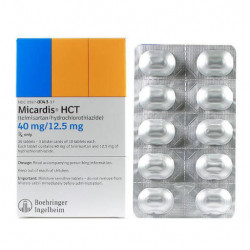Micardis HCT (telmisartan) Coupons, Discounts & Cost
Micardis HCT is an antihypertensive drug consisting of telmisartan (angiotensin II receptor antagonist) and hydrochlorothiazide (thiazide diuretic). One way to save money on the Micardis retail cost regardless of income and insurance status is to use Micardis coupons or discount cards from RXCoupons. Use this Telmisartan coupon at this online pharmacy and receive up to 75% off the sale price.
Useful information about Micardis HCT
Micardis HCT is an antihypertensive drug consisting of telmisartan (angiotensin II receptor antagonist) and hydrochlorothiazide (thiazide diuretic). Such combination leads to a greater antihypertensive effect (significant gradual reduction in blood pressure).
Telmisartan is a specific angiotensin II receptor antagonist. It reduces aldosterone levels. Also, telmisartan reduces systolic and diastolic blood pressure in patients with hypertension. The drug’s effect lasts for more than 24 hours. The hypotensive effect occurs within 3 hours after the first dose of telmisartan. Your blood pressure will gradually return to the initial level in case of abrupt withdrawal.
Hydrochlorothiazide is a thiazide diuretic that increases the excretion of sodium and chloride (equivalent amounts approximately). Hydrochlorothiazide increases aldosterone secretion. This agent reduces the risk of complications of cardiovascular disease and mortality. The maximum effect occurs within 4 hours. The diuretic effect of the drug is maintained for about 6-12 hours.
The combination of telmisartan and hydrochlorothiazide is safe and effective in arterial hypertension (in the case of the ineffectiveness of telmisartan or hydrochlorothiazide as monotherapy). The maximum antihypertensive effect of Micardis HCT can be achieved within 4 weeks after starting treatment.
Learn more about Micardis HCT administration
Micardis HCT should be taken 1 time per day regardless of the meal. The drug can be used in patients who use Micardis (in case of no adequate control of blood pressure).
Patients with mild or moderate renal impairment do not need to change the dose.
Patients with mild or moderate liver function impairment should not exceed the daily dose of 40/12.5 mg.
Older patients taking Micardis HCT should not change the dose.
Learn about the potential side effects of Micardis HCT
Respiratory system: infections of the upper respiratory tract (including bronchitis, pharyngitis, sinusitis), dyspnea, respiratory distress (including pneumonitis and pulmonary edema).
Cardiovascular system: orthostatic hypotension, bradyarrhythmia, necrotizing vasculitis, pain in the chest.
CNS: anxiety, fear, depression, dizziness, insomnia.
Digestive system: abdominal pain, diarrhea, dyspepsia, gastritis, anorexia, dry mouth, vomiting, constipation, pancreatitis, jaundice (hepatocellular or cholestatic jaundice).
Endocrine system: low blood sugar levels in diabetes.
Metabolic abnormalities: hypercholesterolemia, hyperuricemia, hypokalemia, hyperkalemia.
Hematopoietic system: anemia (including aplastic anemia), hemolytic anemia, bone marrow suppression, leukopenia, neutropenia, agranulocytosis, thrombocytopenia.
Urinary system: urinary tract infection, interstitial nephritis, acute kidney failure, glucosuria.
Musculoskeletal system: arthralgia, arthritis, back pain, pain in the legs, myalgia, weakness, muscle spasms.
Allergic reactions: anaphylactic shock, eczema, erythema, itching, cutaneous lupus erythematosus, cutaneous vasculitis, photosensitivity, toxic epidermal necrolysis, angioedema, urticaria, other allergic reactions.
Reproductive system: decrease in potency.
Other reactions: reduced hemoglobin, high uric acid level, flu-like symptoms, fever, sweating.
Study drug contraindications
Learn about contraindications for Micardis HCT:
- Obstructive cholestasis and biliary tract diseases;
- Liver function disturbances;
- Renal dysfunction;
- Hypokalemia, hyponatremia, hypercalcemia;
- Hereditary fructose intolerance (the drug contains sorbitol);
- Patients under 18 years of age;
- II and III trimesters of pregnancy;
- Lactation;
- Hypersensitivity to the drug or to other sulfonamide derivatives.
Consult your doctor if you have liver function test abnormalities or progressive liver disease, bilateral renal artery stenosis or artery stenosis of solitary kidney, chronic heart failure, stenosis of the aortic and mitral valve, hypertrophic obstructive cardiomyopathy, diabetes, coronary artery disease, systemic lupus erythematosus, gout.
Therapy during pregnancy and breastfeeding
Telmisartan is not a teratogenic agent. Nevertheless, it has an embryotoxic effect. Therefore, Micardis HCT should not be used in I trimester of pregnancy. When planning a pregnancy, Micardis HCT should be replaced by other drugs permitted for use during pregnancy. You should immediately stop taking the drug if you are pregnant.
The drug can cause electrolyte abnormalities in the fetus during II and III trimesters of pregnancy, as well as other disorders (neonatal thrombocytopenia, jaundice). Therefore, the drug is contraindicated in the II and III trimester of pregnancy.
Micardis HCT therapy is contraindicated during lactation.

